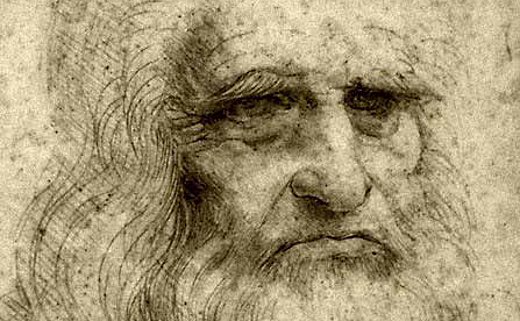Leonardo Da Vinci: I can’t speak for his people skills, but there’s plenty of evidence to suggest that it’s unlikely we’ll ever see someone with such a masterful grasp of both art and technology.
You probably know him as the painter of the Mona Lisa, The Last Supper, and many other Renaissance masterpieces.
These accomplishments alone have earned him a reputation as one of the greatest painters of all time. But his curious, imaginative, prolific mind also led him to pursue excellence in sculpting, architecture, music, mathematics, engineering, inventing, anatomy, geology, cartography, botany, and writing.
Leonardo Da Vinci was perhaps the most diversely talented person ever to have lived.
And on top of all that, he wasn’t one to hide his light under a bushel. When you’re applying for a job, being able to articulate what you’re good at is just as important as being able to do it.
This is a man who really knew how to sell his skills—and it would have served his UX career well. Just check out this letter that he wrote around 1483 to Ludovico Sforza, the Duke of Milan (source: Letters of Note):
Having now sufficiently seen and considered the achievements of all those who count themselves masters and artificers of instruments of war, and having noted that the invention and performance of the said instruments is in no way different from that in common usage, I shall endeavour, while intending no discredit to anyone else, to make myself understood to Your Excellency for the purpose of unfolding to you my secrets, and thereafter offering them at your complete disposal, and when the time is right bringing into effective operation all those things which are in part briefly listed below:
1. I have plans for very light, strong and easily portable bridges with which to pursue and, on some occasions, flee the enemy, and others, sturdy and indestructible either by fire or in battle, easy and convenient to lift and place in position. Also means of burning and destroying those of the enemy.
2. I know how, in the course of the siege of a terrain, to remove water from the moats and how to make an infinite number of bridges, mantlets and scaling ladders and other instruments necessary to such an enterprise.
3. Also, if one cannot, when besieging a terrain, proceed by bombardment either because of the height of the glacis or the strength of its situation and location, I have methods for destroying every fortress or other stranglehold unless it has been founded upon a rock or so forth.
4. I have also types of cannon, most convenient and easily portable, with which to hurl small stones almost like a hail-storm; and the smoke from the cannon will instil a great fear in the enemy on account of the grave damage and confusion.
5. Also, I have means of arriving at a designated spot through mines and secret winding passages constructed completely without noise, even if it should be necessary to pass underneath moats or any river.
6. Also, I will make covered vehicles, safe and unassailable, which will penetrate the enemy and their artillery, and there is no host of armed men so great that they would not break through it. And behind these the infantry will be able to follow, quite uninjured and unimpeded.
7. Also, should the need arise, I will make cannon, mortar and light ordnance of very beautiful and functional design that are quite out of the ordinary.
8. Where the use of cannon is impracticable, I will assemble catapults, mangonels, trebuckets and other instruments of wonderful efficiency not in general use. In short, as the variety of circumstances dictate, I will make an infinite number of items for attack and defence.
9. And should a sea battle be occasioned, I have examples of many instruments which are highly suitable either in attack or defence, and craft which will resist the fire of all the heaviest cannon and powder and smoke.
10. In time of peace I believe I can give as complete satisfaction as any other in the field of architecture, and the construction of both public and private buildings, and in conducting water from one place to another.
Also I can execute sculpture in marble, bronze and clay. Likewise in painting, I can do everything possible as well as any other, whosoever he may be.
Moreover, work could be undertaken on the bronze horse which will be to the immortal glory and eternal honour of the auspicious memory of His Lordship your father, and of the illustrious house of Sforza.
And if any of the above-mentioned things seem impossible or impracticable to anyone, I am most readily disposed to demonstrate them in your park or in whatsoever place shall please Your Excellency, to whom I commend myself with all possible humility.
Tell me you wouldn’t hire this man.
How well do you sell yourself? What new feather could you add to your bow to improve your UX career?
Update: Matt Thomas published this exclusive interview with Leonardo Da Vinci, in which he reveals why he was so multi-disciplined, and gives tips to the designers of today. Brilliant.

